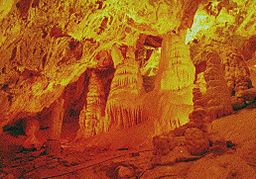Minnetonka Cave facts for kids
Quick facts for kids Minnetonka Cave |
|
|---|---|

Minnetonka Cave, administered by the U.S. Forest Service
|
|
| Location | Bear Lake County, Idaho, United States |
| Discovery | 1907 |
| Geology | Karst cavern, Mississippian Limestone |
| Entrances | 1 |
| Difficulty | Easy |
| Translation | Big/Large Water (Lakota/Dakota/Nakota) |
| Pronunciation | [(Mini-Tah-“nasal n”-Kah)] |
Minnetonka Cave is a large limestone cave in Idaho. You can find it in Cache National Forest in Bear Lake County, Idaho. It's located above the village of St. Charles, which is at the north end of Bear Lake.
The name "Minnetonka" comes from Indigenous languages. It's a way of saying "Mni Tanka" from the Dakota, Lakota, or Nakota dialects. This phrase means "Big Water." You say it like Mini-Tah-“nasal n”-Kah.
Contents
Exploring Minnetonka Cave
You can take tours through Minnetonka Cave. These tours usually run from Memorial Day until Labor Day, if the weather is good. Scenic Canyons Recreational Services manages these tours. They work with the United States Forest Service.
What You'll See Inside
The path through the cave is about half a mile long. As you walk, you will see amazing rock formations. These include stalactites, which hang down from the cave ceiling. You will also see stalagmites, which grow up from the cave floor.
Minnetonka Cave's Bat Residents
Minnetonka Cave is a special place for bats. It acts as a hibernaculum, which is a safe place where animals sleep through the winter. Five different kinds of bats live here.
Bats of Concern
One important bat species found in the cave is the Townsend's Big-eared Bat. Its scientific name is Corynorhinus townsendii. This bat is not on the national endangered species list. However, it is considered a "species of concern" by the State of Idaho and the Forest Service. This means they are watching these bats closely to make sure their populations stay healthy.
 | Selma Burke |
 | Pauline Powell Burns |
 | Frederick J. Brown |
 | Robert Blackburn |

